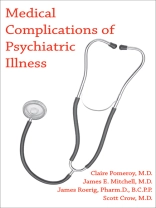Psychiatric patients have an increased rate of morbidity and mortality due to physical illnesses. Distressingly, psychiatrists fail to recognize these comorbid medical illnesses in nearly half of all cases. All too often, the physical illness may be causing or exacerbating the psychiatric symptoms. Furthermore, the psychiatric condition itself and iatrogenic complications of medication or other treatments can result in serious medical pathology.
Until now, most psychiatrists ha...
Psychiatric patients have an increased rate of morbidity and mortality due to physical illnesses. Distressingly, psychiatrists fail to recognize these comorbid medical illnesses in nearly half of all cases. All too often, the physical illness may be causing or exacerbating the psychiatric symptoms. Furthermore, the psychiatric condition itself and iatrogenic complications of medication or other treatments can result in serious medical pathology.
Until now, most psychiatrists have deferred the general medical care of their patients to other practitioners. Yet because psychiatrists are uniquely positioned to provide health care that bridges somatic and mental conditions, they are increasingly being called on to ensure that their patients also receive adequate medical care.
This breakthrough text responds to that call to action from a perspective unique in the literature: It focuses on the medical complications of psychiatric illnesses, rather than the more typical psychiatric complications of medical illnesses.
This concise yet comprehensive book is intended for practitioners who treat adult medical patients. It is divided into two main sections: Health Care of Psychiatric Patients, organized by recommendations for routine medical management and reproductive health, focuses on the general health care maintenance of psychiatric patients with medical illnesses. Also discussed are the unique reproductive health needs of psychiatric patients, who are often at increased risk of coercive or abusive sexual relationships, rape and other sexual assaults, unplanned pregnancy, pregnancy complications, and sexually transmitted diseases. Psychiatric Disorders, organized by diagnostic groupings, focuses on those psychiatric disorders — affective, anxiety, and somatoform disorders and dementia; schizophrenia and other psychotic disorders; Munchausen’s syndrome and other factitious disorders; self-injurious behavior; eating disorders; and alcohol and drug abuse — that most clearly can have medical complications.
Using extensive notes and tables throughout, these distinguished contributors have created far more than just another compendium of medical illnesses that can present with psychiatric symptoms. Here you’ll find a practical, detailed roadmap that will be welcomed not only by students, residents, and clinicians working with adult psychiatric patients who develop medical complications, but also by practitioners who manage psychiatric patients in a general medical practice.












